

Can Artificial Intelligence Replace Human Therapists? Could artificial intelligence reduce the need for human therapists?
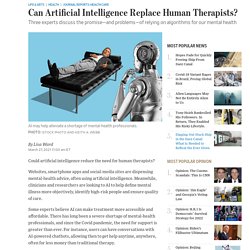
Websites, smartphone apps and social-media sites are dispensing mental-health advice, often using artificial intelligence. Meanwhile, clinicians and researchers are looking to AI to help define mental illness more objectively, identify high-risk people and ensure quality of care. Some experts believe AI can make treatment more accessible and affordable.
There has long been a severe shortage of mental-health professionals, and since the Covid pandemic, the need for support is greater than ever. For instance, users can have conversations with AI-powered chatbots, allowing then to get help anytime, anywhere, often for less money than traditional therapy. Despite the promise, there are some big concerns. Argument technology for debating with humans. The study of arguments has an academic pedigree stretching back to the ancient Greeks, and spans disciplines from theoretical philosophy to computational engineering.
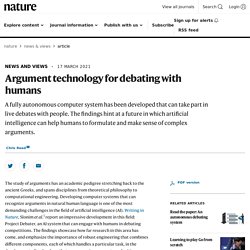
Developing computer systems that can recognize arguments in natural human language is one of the most demanding challenges in the field of artificial intelligence (AI). Writing in Nature, Slonim et al.1 report an impressive development in this field: Project Debater, an AI system that can engage with humans in debating competitions. The findings showcase how far research in this area has come, and emphasize the importance of robust engineering that combines different components, each of which handles a particular task, in the development of technology that can recognize, generate and critique arguments in debates. Project Debater is, first and foremost, a tremendous engineering feat. AI Should Augment Human Intelligence, Not Replace It. News. , the Market-Leading Conversational AI Solution. He got Facebook hooked on AI. Now he can't fix its misinformation addiction.
Within a year his team had developed these models, as well as the tools for designing and deploying new ones faster.

Before, it had taken Quiñonero’s engineers six to eight weeks to build, train, and test a new model. Now it took only one. News of the success spread quickly. The team that worked on determining which posts individual Facebook users would see on their personal news feeds wanted to apply the same techniques. Researchers at Utrecht University Develop an Open-Source Machine Learning (ML) Framework Called ASReview to Help Researchers Carry Out Systematic Reviews. Scientists often start their research on a topic by reviewing previous study findings.
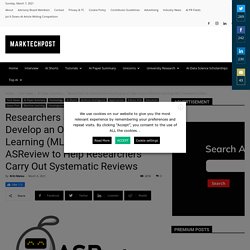
Therefore, conducting systematic literature reviews or meta-analyses can be very demanding and time-consuming. There may be an extensive amount of research available focusing on different topics, which may not always be relevant to a researcher’s work. Researchers at Utrecht University have developed a machine learning framework that could significantly accelerate this process by automatically running through numerous past studies and compiling high-quality literature reviews. This framework is called ASReview, which could prove particularly useful for scientists in researching the COVID-19 pandemic. Evolutionary Algorithms - Design Beyond Imagination. Take a good look at what you're seeing above — these bizarre, bent paperclip-looking objects don't look like much, and chances are you don't know what you're staring at.
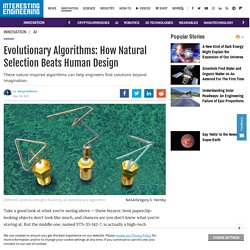
But the middle one, named ST5-33-142-7, is actually a high-tech communications antenna that holds the title of the world's first artificially evolved hardware to fly in space. Almost two decades ago, NASA engineer Jason Lohn stood at the Evolvable Systems group at Ames Research Center's Computational Sciences Division with his fingertips wrapped around the unusual design, announcing a breakthrough. "This was designed by a computer — that's the cool thing about it, and it actually works,” he said. An open-source machine learning framework to carry out systematic reviews. When scientists carry out research on a given topic, they often start by reviewing previous study findings.
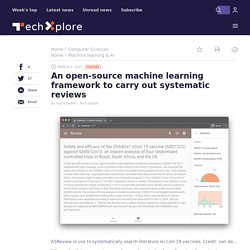
Conducting systematic literature reviews or meta-analyses can be very challenging and time consuming, as there are often huge amounts of research focusing on different topics, which may not always be relevant to a researcher's work. Researchers at Utrecht University have recently developed a machine learning framework that could significantly speed up this process, by automatically browsing through numerous past studies and compiling high quality literature reviews. This framework, called ASReview, could prove particularly useful for conducting research during the COVID-19 pandemic. Startup bets on artificial intelligence to counter misinformation. A beginner’s guide to AI: Ethics in artificial intelligence. Welcome to Neural’s beginner’s guide to AI.
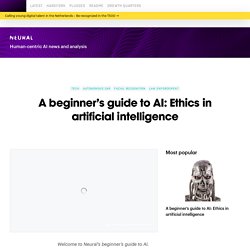
This long-running series should provide you with a very basic understanding of what AI is, what it can do, and how it works. In addition to the article you’re currently reading, the guide contains articles on (in order published) neural networks, computer vision, natural language processing, algorithms, artificial general intelligence, the difference between video game AI and real AI, and the difference between human and machine intelligence. The most obvious solution for a given problem isn’t always the best solution. For example: it’d be much easier for us to dump all of our trash on our neighbors lawn and let them deal with it. But, for a variety of reasons, it’s probably not the optimal solution. Can AI Decide - What's Best for Humanity? It seems cliche to say artificial intelligence is active in almost every aspect of modern life, as it manages big-data analytics, recognizes masked faces in urban environments amid the COVID-19 crisis, and even pushes the boundaries of quantum computing.
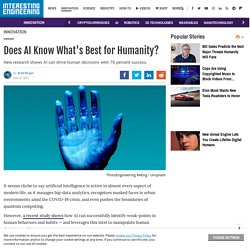
However, a recent study shows how AI can successfully identify weak-points in human behaviors and habits — and leverages this intel to manipulate human decision-making. You don't have to pack a prepper kit and escape into the wilderness to move beyond the reach of AI in the present day. But the next steps of AI place computer abilities increasingly closer to realities both ideal and dystopian. The question, then, is raised: does AI know what's best for humanity? Developing Algorithms That Might One Day Be Used Against You. Twitter Bots Are a Major Source of Climate Disinformation. Twitter accounts run by machines are a major source of climate change disinformation that might drain support from policies to address rising temperatures.
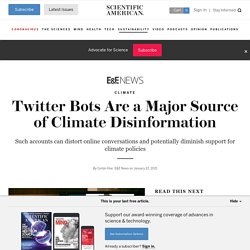
In the weeks surrounding former President Trump’s announcement about withdrawing from the Paris Agreement, accounts suspected of being bots accounted for roughly a quarter of all tweets about climate change, according to new research. “If we are to effectively address the existential crisis of climate change, bot presence in the online discourse is a reality that scientists, social movements and those concerned about democracy have to better grapple with,” wrote Thomas Marlow, a postdoctoral researcher at the New York University, Abu Dhabi, campus, and his co-authors. Their paper published last week in the journal Climate Policy is part of an expanding body of research about the role of bots in online climate discourse.
The new focus on automated accounts is driven partly by the way they can distort the climate conversation online. What makes AI algorithms dangerous? Welcome to AI book reviews, a series of posts that explore the latest literature on artificial intelligence.

When discussing the threats of artificial intelligence, the first thing that comes to mind are images of Skynet, The Matrix, and the robot apocalypse. The runner up is technological unemployment, the vision of a foreseeable future in which AI algorithms take over all jobs and push humans into a struggle for meaningless survival in a world where human labor is no longer needed. Whether any or both of those threats are real is hotly debated among scientists and thought leaders. But AI algorithms also pose more imminent threats that exist today, in ways that are less conspicuous and hardly understood. In her book, Weapons of Math Destruction: How Big Data Increases Inequality and Threatens Democracy, mathematician Cathy O’Neil explores how blindly trusting algorithms to make sensitive decisions can harm many people who are on the receiving end of those decisions. So far, so good. How Facebook’s Yann LeCun is charting a path to human-level artificial intelligence.
When Yann LeCun founded the Facebook AI Research (FAIR) lab in 2013, artificial intelligence was entering a boom period that his research helped trigger. Facebook’s chief AI scientist had been among a group of computer scientists who retained faith in deep neural networks during an “AI winter” of reduced funding and interest in the field. In 2019, his efforts earned him a share of the Turning Award, together with his friends Yoshua Bengio and Geoffrey Hinton. Today, AI is now an essential component of Facebook’s vast array of applications, touching everything from Messenger to content moderation. “You take AI out of Facebook, and basically the services crumble,” LeCun tells TNW. I used an algorithm to help me write a story. Here’s what I learned. Another difference was that with “Twinkle Twinkle,” I followed the algorithm’s stylistic instructions to the letter.
The style was the computer’s, not mine. You can see examples of the interface below. If the “abstractness” tag was red, that meant I wasn’t being as abstract as the algorithm said I should be, so I’d go through the story changing “spade” to “implement” or “house” to “residence” until the light went green. The interface gave me instant feedback, but there were 24 such tags, and going through the story to make them all green was labor intensive. Sometimes fixing the number of adverbs would make my paragraphs too long for the algorithm’s liking; sometimes by fixing the average word length I’d be compromising the “concreteness” of the language. The UN says a new computer simulation tool could boost global development.
The news: The United Nations is endorsing a computer simulation tool that it believes will help governments tackle the world’s biggest problems, from gender inequality to climate change. Global challenges: In 2015, UN member states signed up for a set of 17 sustainable-development goals that are due to be reached by 2030. They include things like “zero poverty,” “no hunger,” and “affordable and clean energy.” Ambitious is an understatement. How could the tool help? Bots Evolving to Better Mimic Humans – May Prove Harder to Detect in 2020 Elections. New study by USC researchers shows bots evolving to better mimic humans during elections. USC Information Sciences Institute (USC ISI) computer scientist, Emilio Ferrara, has new research indicating that bots or fake accounts enabled by artificial intelligence on social media have evolved and are now better able to copy human behaviors in order to avoid detection.
In the journal First Monday, research by Ferrara and colleagues Luca Luceri (Scuola Universitaria Professionale della Svizzera Italiana), Ashok Deb (USC ISI), Silvia Giordano (Scuola Universitaria Professionale della Svizzera Italiana), examine bot behavior during the US 2018 elections compared to bot behavior during the US 2016 elections. The researchers studied almost 250,000 social media active users who discussed the US elections both in 2016 and 2018, and detected over 30,000 bots.
They found that bots in 2016 were primarily focused on retweets and high volumes of tweets around the same message. Blender, Facebook State-of-the-Art Human-Like Chatbot, Now Open Source. Blender is an open-domain chatbot developed at Facebook AI Research (FAIR), Facebook’s AI and machine learning division. According to FAIR, it is the first chatbot that has learned to blend several conversation skills, including the ability to show empathy and discuss nearly any topic, beating Google's chatbot in tests with human evaluators.
Some of the best current systems have made progress by training high-capacity neural models with millions or billions of parameters using huge text corpora sourced from the web. Our new recipe incorporates not just large-scale neural models, with up to 9.4 billion parameters — or 3.6x more than the largest existing system — but also equally important techniques for blending skills and detailed generation. Facebook Releases Open-Source Chatbot Blender, Claims It beats Google's Meena - Voicebot.ai. On May 4, 2020 at 12:30 pm Facebook has launched a new chatbot called Blender that it claims is the best in the world. Facebook open-sources Blender, a chatbot people say 'feels more human'
How AI can help us harness our 'collective intelligence' - BBC Worklife. But the reasons why it can be hard to combine machines and humans are also central to why they work so well together, says Baeck. AI can operate at speeds and scales far out of our reach, but machines are still a long way from replicating human flexibility, curiosity and grasp of context. Google Says Its Chatbot Is Capable of Near-Human Conversation. Why asking an AI to explain itself can make things worse. Upol Ehsan once took a test ride in an Uber self-driving car. Instead of fretting about the empty driver’s seat, anxious passengers were encouraged to watch a “pacifier” screen that showed a car’s-eye view of the road: hazards picked out in orange and red, safe zones in cool blue. The apps you use on your phone could help diagnose your cognitive health.
Differences in the way healthy and cognitively impaired individuals used their smartphones were enough to tell them apart. These “xenobots” are living machines designed by an evolutionary algorithm. Meet the xenobots: Tiny living robots have been created using cells taken from frog embryos. Each so-called xenobot is less than a millimeter across, but one can propel itself through water using two stumpy limbs, while another has a kind of pouch that it could use to carry a small load.
Okay, but ... why? The early research, published in Proceedings of the National Academy of Sciences, could help the development of useful soft robots that can heal themselves when damaged. These “xenobots” are living machines designed by an evolutionary algorithm. The US just released 10 principles that it hopes will make AI safer - TECHTELEGRAPH. The White House has released 10 principles for government agencies to adhere to when proposing new AI regulations for the private sector.
The move is the latest development of the American AI Initiative, launched via executive order by President Trump early last year to create a national strategy for AI. Two years of data reveal what people on Reddit are most worried about. In December 2019, Mathias Nielsen posted a graph on Reddit with the title “What worries Reddit? Facebook and Twitter shutter pro-Trump network reaching 55 million accounts. On Friday, Facebook and Twitter shut down a network of fake accounts that pushed pro-Trump messages all while “masquerading” as Americans with AI-generated faces as profile photos.
Internet Observatory - Bing’s Top Search Results Contain an Alarming Amount of Disinformation. In The 2010s, We All Became Alienated By Technology. Instagram now demotes vaguely ‘inappropriate’ content. Instagram to now flag potentially offensive captions, in addition to comments. The Future of the Web - GHVR - Medium. Why You Can’t Have a Decent Conversation With Your Voice Assistant Yet. If Facebook Is Dealing with Deceptive ‘BL’ Network, It's Not Working.
How Apple personalizes Siri without hoovering up your data. YouTube says it is finally trying to make the site less toxic. This is how Facebook’s AI looks for bad stuff. Google Assistant adds topical podcast search and photo sharing via voice. Here's What a 5-Day Break From Facebook Will Do for Your Brain. Facebook May Face Another Fake News Crisis in 2020. YouTube says it has cut ‘borderline content’ like miracle cures. A Rating System for Claims Made in Popular Science Books? Woebot - Your charming robot friend who is ready to listen, 24/7. How Artificial Intelligence Could Save Psychiatry. Google’s Do-Good Arm Tries to Make Up for Everything Else. Facebook says it’s getting better at weeding out child sex abuse images. Twitter Details Political Ads Ban, Issue Ads Allowed. Seattle faith groups reckon with AI — and what it means to be ‘truly human’ News - Breaking: Twitter CEO Announces Total Political Ads Ban.
Young Men are Lonelier Than Ever Before Says Recent Study. Anger, Anxiety, Insomnia: Predicting Lonely Twitter Users by Their Tweets. This is how Facebook’s AI looks for bad stuff. Hunting Down Cybercriminals With New Machine-Learning System. Wikipedia’s civil wars show how we can heal ideological divides online. Google's search results will highlight original reporting. To Spot Fake News, AI Uses These Clues — and You Can Put Them to the Test. An important quantum algorithm may actually be a property of nature. Council Post: How AI Can Create And Detect Fake News. YouTube's Plan To Rein In Conspiracy Theories Is Failing. Machines Shouldn’t Have to Spy On Us to Learn. A.I. Powered Civil Servants Could Take Over the Government. Robots Could Make Mean, Effective Teachers, Early Evidence Suggests. YouTube's Recommendation Algorithm Has a Dark Side.
The Internet Knows You Better Than Your Spouse Does. Facebook is judging how trustworthy you are: What you need to know. How artificial intelligence can help achieve the promise of personalized learning (opinion) Unity offers guidelines for what it considers ethical AI design. Our Response to the UK Government request for written evidence on A.I. « RobotEnomics. 9 ways AI isn't going to be like Hollywood. Facebook fights fake news with links to other angles. Artificial Intelligence Is Stuck. Here’s How to Move It Forward. - The New York Times. Robotic Teachers Can Adjust Style Based on Student Success. How Fake News Goes Viral. The Rise of the Weaponized AI Propaganda Machine. Facebook to add 3,000 to team reviewing posts with hate speech, crimes, and other harming posts.
Berkeley Open Infrastructure for Network Computing. Can AI Rescue Us From Violent Images Online?